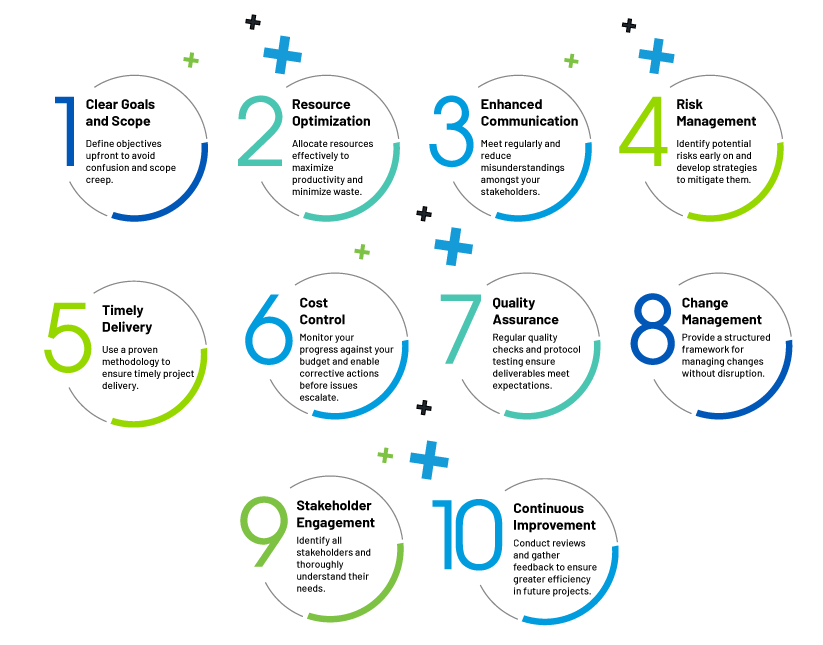Imagine your organization is engaged in multiple projects each with its own objectives, deadlines and stakeholders. Now, picture this firm without any form of project management. Why project management, you ask? Projects begin with excitement – but soon, confusion reigns. Deadlines are missed, budgets spiral out of control and your stakeholders are frustrated. Like a headless chicken running aimlessly, the organization’s efforts lack direction and coordination. This chaos underscores a crucial point: without effective project management, projects are destined to fail.
The importance of project management cannot be overstated. It is the backbone of any successful endeavor. It provides the structure, strategy and tools necessary to navigate the complexities of a project at hand. Let’s dive into the top 10 reasons why project management should be non-negotiable.
10 Reasons Why Project Management Should Be Non-negotiable

1. Clear Goal Setting and Scope Definition
Proper project management ensures that the projects’ goals and scope are clearly defined from the start. This clarity helps avoid scope creep, where project requirements continuously expand beyond the initial plans, leading to delays and budget overruns.
2. Efficient Resource Allocation
Projects often operate with limited resources at their disposal. Having proper project management assists in identifying and assigning resources properly, optimizing productivity and reducing waste.
3. Enhanced Communication and Collaboration
Effective project management promotes clear communication among stakeholders. Regular updates, meetings and check-ins keep the team is aligned, reducing misunderstandings and encouraging better communication. A project management office (PMO) also establishes consistent practices and templates, ensuring all teams follow the same communication, reporting and documentation processes.
4. Risk Management
Every project comes with its own set of risks. Successful project management involves identifying potential risks early on and developing strategies to mitigate them, keeping the project on track.
5. Timely Delivery
Project managers use methodologies like Waterfall and Agile to ensure timely project delivery. Waterfall’s linear phases help identify bottlenecks early and allocate resources efficiently, while Agile’s iterative sprints promote flexibility and continuous improvement. Both methods emphasize accountability through their defined roles and regular progress reviews, making project management essential for meeting deadlines, adapting to changes and ensuring successful project execution.
6. Cost Control
Budget overruns are always a common fear among stakeholders. Project management involves detailed budget planning, monitoring and expense tracking. This vigilance will keep the project within its financial constraints. Regular monitoring of progress against the budget allows early identification of cost overruns, enabling corrective actions before issues escalate.
7. Quality Assurance
Everyone involved prioritizes delivering a high-quality project. Quality assurance processes, such as regular quality checks, testing protocols and reviews, ensure deliverables meet both project and stakeholder expectations. These practices increase stakeholder satisfaction, build trust and enhance reliability.
8. Change Management
Changes are inevitable. Project management provides a structured framework for managing changes without disrupting the overall project. This ensures changes are evaluated, documented and implemented consistently and in a controlled manner.
9. Stakeholder Engagement
Effective project management involves identifying all stakeholders and understanding their needs. The PMO ensures established and consistent communication channels with stakeholders; engaging them throughout the project’s lifespan fosters trust and transparency, which is crucial for success.
10. Continuous Improvement
Project management doesn’t end with project delivery; it includes evaluations of where improvements can be made. The PMO can facilitate post-project reviews, where teams reflect on successes and challenges. By conducting thorough reviews and gathering feedback, stakeholders can identify lessons learned and best practices moving forward, ensuring greater efficiency in future projects. By standardizing methodologies, the PMO ensures that successful practices from one project are replicated across others.
Takeaways
Projects are often complex and multifaceted; understanding the importance of project management is essential to prevent even the best-planned initiatives from becoming unmanageable. It brings order to chaos, ensures efficient resource use and guarantees that projects are delivered on time, within budget and to the highest quality possible. By investing in project management practices, you can enhance stronger relationships and achieve sustained success.
Author: Isabelle Filion, CPA, CSM | [email protected]
Contact Us
For more information on this topic, please contact a member of Withum’s Business and Management Consulting Team.



